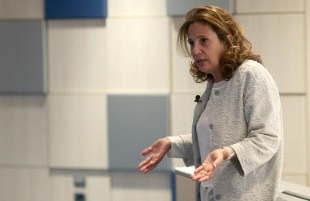- Coronavirus, sequenced genomes of patient China and Codogno
Share
March 02, 2020 "The narrative of the pandemics of the 21st century is this: the danger does not directly concern highly lethal viruses that cannot be controlled, but rather their rapid spread and the consequent collapse of the health system". This was stated today by Ilaria Capua, virologist and professor at the University of Florida, during the webinar: "What you need to know about the coronavirus". The virologist, in connection from the United States, explained that "when we think of a pandemic, we always think of the Spanish flu of the last century, a much more aggressive virus", but the coronavirus is another matter entirely: "and then not there were neither antibiotics nor vaccines. " "The infection occurs with particular gravity in some categories of people, who present risk factors, from diabetes to old age: people who are fragile from the health point of view. For this reason, the virus can cause a much greater number of hospitalizations higher than what the national health service is able to manage. We are trying to mitigate the infection, to get it out of the box: if it all came together, it would be difficult to be able to give adequate medical care to everyone, "he stressed. This is the strategy adopted first by China and Japan and now also by South Korea and Italy, "which are taking on the cost that will serve to protect everyone and ensure that the epidemic gallops". But why does the virus move so fast? "Not only did he adapt to very effective, but he also found 'green traffic light meadows', given that none of us have the antibodies to counter it - stressed Capua - But the more he gallops, the more we develop antibodies. If the measures of containment proved too effective, the population would not be able to immunize themselves as it should "."Italy is under observation, the world is looking to see how a western country can react to coronavirus. However, I hear many protests: the situation is very difficult, it is the first time that you manage such a circumstance and you can be wrong. I wish but see more understanding and support from the social fabric ". This is the appeal of the virologist Ilaria Capua, in connection from Miami. "From the beginning, I had no doubts that the virus would travel around the world - he said - I however proposed to call this phenomenon 'flu-like syndrome caused by coronavirus', to try to make this unknown enemy closer to ours fictional". The clinical picture, in fact, refers to the flu: "We still don't know many things but we try to put together the information we have about past epidemics", explained the doctor, a former deputy of Civic Choice. "We have no scientific evidence on the danger or safety of this virus - continued Capua - I turn to companies: who can, adopt telework. If you can get 20% fewer people moving, let's do it. I would also recommend setting up support centers, for example setting up a task force to support pregnant women, who are in a moment of psychological and physical fragility. A woman panicked by the baby she carries in her womb can do more harm than millions of viruses put together, only a few false rumors that start circulating on the internet are enough. Give women even greater hourly flexibility: they are the ones who have to accompany the children to school and look after the elderly: let's help them ".
"Viruses don't look at anyone: in the coronavirus emergency we are all in it. We are called to exercise collective responsibility. In a couple of weeks we will have to have a clearer idea of the real extent of the infection in Italy, so that we can make some assessments. I am sure that there are thousands of infected in Italy: there could be 2 thousand, 8 thousand, 5 thousand or 500 thousand. As soon as we know it, we can hypothesize the epidemic curve and understand when it can stabilize. This 'black swan' must to be a tool to embrace some decisive technologies. With Stefano Quintarelli, I launched the project "The school continues": schools must be placed in a position to continue teaching. From Milan to Catanzaro, not all schools have the same platforms, but we need to find the system to adapt to every type of school. We could invest in processes of smart school, smart education and smart working, which can engage a cir positive result. Even the big information technology companies could help, freeing up some resources to keep the country alive: there will be a great process of readaptation. "Ilaria Capua, virologist and professor at the University of Florida said today , during the "What you need to know about the coronavirus" webinar.

